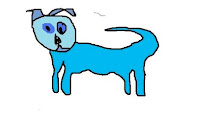I just finished No Direction Home, Scorsese’s documentary on Bob Dylan’s life and music. I know this came out in 2005, and I’m a little late to the party, so I'll try not go on too long here. It just struck me as so poignant as to the idea of art criticism. Here is a man who by all accounts now, was completely ahead of his time then, but so many people couldn’t tell what he was doing. Or why. I mean can you imagine being one of those ridiculous people in the crowd at the show in England? One of the ones captured on film after the show, calling Dylan a traitor? Or how about the person who yelled, “Judas” in the last scene of the documentary? What do you think that guy is doing right now? I’ve looked back on some discussions I’ve had in the past about music and later felt kind of stupid for things I’ve said, for holding my views a bit too strongly. But that guy…what would you do if you were him watching that?
It just seems that from the artistic perspective, one must try to surround himself with his own instinct and a few people who he can trust, and who’ll trust him--this seemed to be for Dylan his backing band, The Band, who Dylan calls "knights" for standing behind him. And from the observer’s perspective it just seems like we all might want to be a little less reactionary. Take it in. There is that chance you don’t understand it. One should approach with caution and humility. I’m not saying don’t have your opinions. Just understand that if you speak with too much conviction, you might end up just being wrong. There are countless examples beyond Dylan. And it goes both ways. We are often too quick to anoint someone as the second coming, only to realize later we spoke too soon. I think it may be time to stop trying to prove what we know, and accept art as an attempt to address what we do not know. Therefore, our observances of it should follow in line. I know this is hard, especially in society today, where everything is instant. But it might be worth considering consideration prior to judgment. To sit and mull something over. I believe that maybe, as we grow up, we accumulate more knowledge of all the things we have been wrong about, and this might not be such a bad thing, because it can help us to step forward with more patience and empathy. Or, if not empathy, it may, if we consider our past, help us to not look extremely foolish in a documentary years later.
One quote I didn’t like in the movie: from Bobby Neuwirth: “Artistic success was not dollar-driven…[those were] simpler times.” He’s speaking obviously of then and now. Then being the sixties. I kind of hate the term “simpler times.” Different factions have always judged things differently, and I doubt there was no one judging “art” of that time in terms of money. Not everyone was looking at the art with only concern for the art and the artist. Of course there were people wondering how they could make a dime off of it/him/her. Just as today not everyone judges art by the amount of money it makes.
One quote that I loved: from Bob Dylan: “You can’t be wise and in love at the same time.” He’s speaking of not inviting Joan Baez on stage at a show in England. Right after he says it he gives this little grin that is filled with so much: humor, arrogance, longing, knowing. I mean, come on, right, that’s a great quote.
Subscribe to:
Post Comments (Atom)
When You Get Bored Here, Go Here:
About Me
- David Luke Doody
- David Luke Doody is a freelance writer and editor. He is a founding editor of InDigest Magazine (www.indigestmag.com), an online literary magazine and the blog editor for Guernica Magazine (www.guernicamag.com). His writing and interviews have appeared in those magazines as well as in The Huffington Post, mnartists.org, The Minnesota Twins Yearbook, and Intentionally Urban Magazine, among others.
This is how my nephew loves me

Search This Blog
Followers
Blog Archive
-
▼
2007
(39)
-
▼
July
(15)
- Lesson Learned?...Probably Not
- Black Snake Moan--A DVD Review
- 826NYC
- An Article
- Sound Familiar?
- What?
- Positive Hip Hop For Seventeen Years, Y'all
- The Night Angels Took Over The Trains
- Go! Hurry!
- How Did I Get Here?
- The Key To a Good BBQ And Other Things I Learned A...
- Hell's Kitchen
- I'm a hypocrite
- No Direction Home
- The housemates went north
-
▼
July
(15)




No comments:
Post a Comment